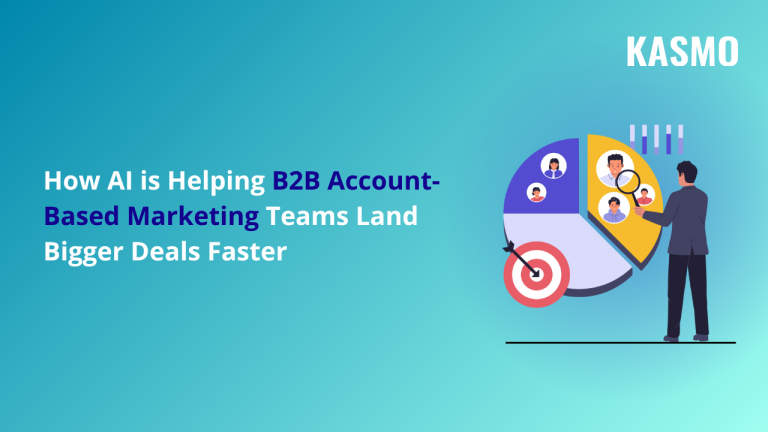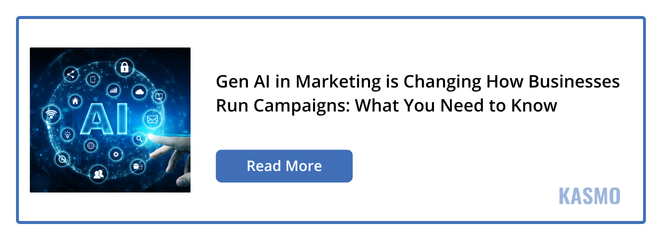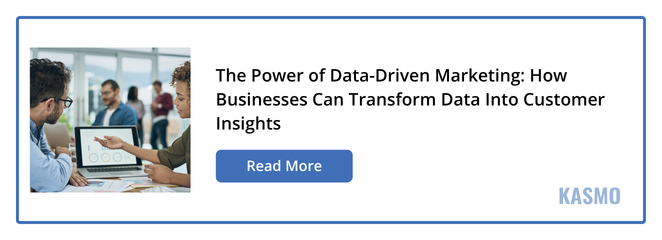Account-Based Marketing (ABM) is no longer just a strategy, it’s the engine driving high-value B2B growth. Rather than chasing broad lead lists, companies now focus on selective accounts with the highest revenue potential. According to Gartner, “ABM can provide a lift across several key metrics, including a 28% increase in overall account engagement and a 25% rise in the marketing-qualified lead (MQL) to sales-accepted lead (SAL) conversion rates.” Yet, businesses face challenges like siloed data, slow decision-making, limited personalization, and a lack of real-time adaptability.
Marketers struggle with static account lists, surface-level personalization, and limited scalability, while sales teams grapple with fragmented insights that slow outreach and reduce deal velocity. This disconnect between intent and execution has created the need for a smarter, more agile approach.
AI-powered ABM answers these challenges. AI uses updated data, enables predictive scoring, automates account selection, and provides hyper-personalized engagement across channels. AI-driven platforms like Snowflake help businesses make smarter decisions, maximize ROI, and drive measurable business growth.
In this blog, we explore the need for ABM, the challenges with traditional methods, and how Snowflake helps B2B organizations transform their ABM strategies using AI Data Cloud.
What is Account-Based Marketing?
Account-Based Marketing (ABM) is a strategic approach to B2B with synchronized and consistent marketing and sales activities. ABM is an increasingly popular approach for B2B companies that target enterprises or other large accounts. These strategies focus on targeting a specific group of audiences or accounts with high potential for conversion rather than casting a wide net. So, ABM uses resources to nurture specific leads, ideal customer profiles (ICP). An effective ABM marketing requires a deep understanding of target accounts, precise timing, personalized execution across multiple channels, and seamless sales alignment.
This collaborative approach includes personalized marketing and coordinated campaigns tailored to the specific needs of individuals within those target organizations to gain maximum ROI. By using this targeted marketing and sales strategy, businesses can build stronger customer relationships, increase win rates, allocate resources, and drive business growth.
Breaking Down the Barriers of Traditional ABM
Manual Leads Segmentation to Missed Opportunities
Traditional ABM strategies often depend on manual segmentation, where marketers and sales teams select target accounts based on historical data like company size, revenue, or industry. This approach is time-consuming, error-prone, and does not include evolving market shifts. Due to this, businesses might lose high-potential accounts, and marketing teams spend time and effort on targeting the wrong prospects.
Siloed Data and Insights
Organizations majorly face the issue of scattered customer data across multiple systems like CRM platforms, marketing teams, sales dashboards, and spreadsheets. These silos act as a barrier to gaining a broader view of the entire customer journey, which in turn affects aligning sales and marketing efforts. Data silos affect B2B ABM efforts, and the team cannot deliver relevant content, measure campaign success, or identify a potential account.
Lack of Real-Time Adaptability
B2B customer buying decisions are not constant; a prospect willing to buy today may not be interested tomorrow. As traditional ABM operates on static data, it does not include changing buyer behavior or market signals. If potential accounts lose interest, traditional systems fail to respond in time. This leads to missed opportunities due to a lack of engaging prospects and nurturing them at the right time. This results in lost leads and lowered revenue.
Slow Decision-Making
Slow decision-making is a major challenge in B2B ABM; it leads to poor customer experiences, resource wastage, and lost revenue. Most of the traditional ABM still includes manual reporting and outdated insights, which have a direct impact on decision-making. The delayed process reduces campaign effectiveness, and teams miss the opportunity to connect with value accounts. Slow decision-making limits responsiveness and weakens alignment between sales and marketing teams.
Limited Personalization at Scale
While personalization is a key aspect of ABM success, using traditional models does not enable businesses to deliver customized experiences at scale. Creating tailored content or messaging for each account manually is time-consuming, which results in generic campaigns and fails to convince decision-makers. Manual personalization efforts are resource-intensive, leading to prolonged sales cycles and high costs. So, B2B organizations need to gain AI-driven insights to deliver personalization with efficiency.
How AI Transforms B2B Account-Based Marketing for High-Value Sales
Artificial intelligence is advancing B2B ABM capabilities, data-driven insight, and automated accounts segmentation. By avoiding static data usage, AI empowers marketers and sales teams to identify, engage, and convert accounts with precision.

Smarter Account Selection
AI empowers B2B marketers to identify and target high-value accounts. They can easily identify accounts that are most likely to convert and turn into loyal customers. AI avoids using static data and analyzes a multitude of data points like historical sales data, customer profiles, engagement history, industry trends, etc. Using these AI algorithms predicts and ranks accounts by their conversion potential. Smarter and effective account selection and prioritization help teams to focus resources on the most promising opportunities, maximizing ROI and reducing wasted effort on low-impact leads.
Hyper-Personalization at Scale
AI transforms personalization into a smart and scalable strategy. Following manual tailoring tasks for every decision-maker in a high-value account is difficult. By using AI, teams can analyze behavioral patterns, past interactions, contextual signals, and company data to create customized messaging that connects with each prospect. Businesses can email content, personalized texts, and targeted ads using AI-powered tools. Natural Language Processing (NLP) helps to refine messaging that specifically caters to customers’ pain points. For example, AI can determine which whitepaper, case study, or demo connects with stakeholder needs. This level of personalization positively influences decision-makers, drives engagement, and builds customers’ trust and credibility.
Predictive Engagement Scoring
AI models can identify which accounts are most likely to engage or convert. AI analyzes historical data, engagement patterns, buying intent, and behavioral trends to provide predictive engagement scores. This scoring helps sales and marketing teams prioritize their accounts and focus on nurturing them to maximize ROI for high-intent accounts. Predictive insights are effective for companies to refine strategies, gain higher conversion rates, and shorten sales cycles.
Optimizing Engagement Orchestration
Knowing what to say is important, but when and where to say it is equally critical in Account-Based Marketing (ABM). AI can analyze engagement patterns across channels and intelligently predict when, where, and how to reach each decision-maker. It helps teams to personalize content at every touch point, email, ads, campaigns, and social media, to provide consistent and relevant interactions for buyers. AI also identifies which channel is effective to reach and engage specific stakeholders. AI-powered ABM platforms can automate these actions and help sales teams convert each opportunity into customers.
AI-driven Decision-Making
Static data leads to poor insights, which results in missed opportunities. AI resolves this issue and empowers marketers to make agile, data-driven decisions in real time. AI integrates with CRM systems, tracking engagement metrics and adjusting outreach strategies. Machine learning models also analyze competitor movements, pricing trends, and customer needs to advance marketing efforts. This AI approach helps B2B teams stay ahead, optimize budgets, resource allocation, and scale personalized experiences to customer relationships.
Build Predictive Models using Snowflake to Enhance B2B Account-Based Marketing
Snowflake helps B2B organizations transform their Account-Based Marketing (ABM) by turning fragmented data into actionable intelligence. As we know, the major challenge in ABM is disconnected data that affects marketing and sales, and the lack of proper insights. Snowflake eliminates these silos by creating a single source of truth that integrates CRM, marketing automation, and third-party intent data into a unified platform.
Snowflake’s AI Data Cloud provides the necessary infrastructure and tools to design and use predictive account-based marketing (ABM) programs. By centralizing first-party data and enriching it with third-party data from the Snowflake Marketplace, companies can predict which accounts are most likely to convert, moving beyond simple targeting.
With Snowflake’s scalable architecture and secure data-sharing capabilities, organizations can deliver real-time insights across teams. Marketers gain a holistic view of every account—understanding not just who’s engaging, but how, when, and why. This enables smarter segmentation, better lead scoring, and more personalized outreach.
The predictive model helps businesses optimize their budget allocation. Teams can insightfully allocate resources, minimize guesswork, and maximize ROI. Data-driven predictions make outcomes measurable, encouraging teams to focus on delivering tangible results.
As insights are continuously updated, enabling real-time adjustments to manage strategies, align market shifts, and gain trends. ABM teams gain actionable intelligence that drives personalized engagement, higher conversion rates, and measurable business impact.
Conclusion
AI-powered ABM is no longer a futuristic concept; it is transforming B2B organizations’ engagement with their valuable accounts. Instead of relying on manual targeting and fragmented outreach, businesses can now identify intent signals in real-time, engage decision-makers, optimize resource allocation, and scale personalized interactions using predictive models. B2B account-based marketing gains a new shift with AI, stronger account relationships, higher conversion rates, and maximizes ROI across the enterprise. ABM powered by AI and Snowflake helps organizations to overcome traditional method challenges and maximize account engagement while accelerating growth.





